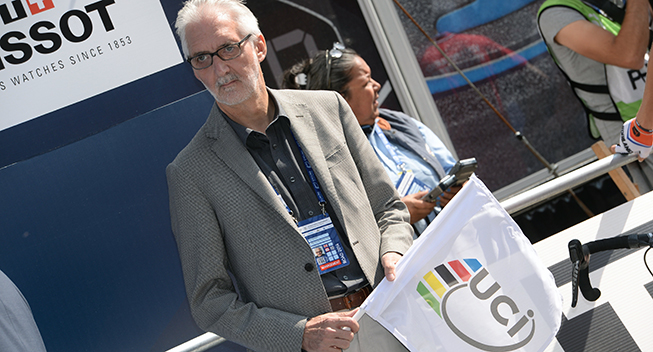Brian Cookson, the president of world cycling’s governing body, the UCI, has warned those tempted to experiment with “mechanical doping” that they “will be caught sooner or later”, but acknowledged that the problem may be more widespread than previously feared.
Cookson was speaking at a press conference on Sunday at the World Cyclocross Championship in Heusden-Zolder, in Belgium, a day after the sport was rocked by the news that the Belgian under-23 rider Femke van den Driessche’s bike had been seized by the authorities for suspected mechanical doping.
Van den Driessche, whose bike was found to be concealing a motor, protested her innocence on Sunday, telling Belgian media outlet Sporza that there had been a mistake and the bike belonged to a friend with whom she had been training.
“I don’t know how that bike got there,” said the 19-year-old, reportedly in tears. “I was surprised to see that bike standing there. It’s not my bike. There’s been a mistake,” she said according to the Belgian outlet.
Van den Driessche’s brother is serving a ban for using the banned blood booster EPO. Whether or not his sister is telling the truth, the existence of the bike provides further proof that mechanical doping represents a real danger to cycling.
The current scandal isn't the first of its sort to hit the world of cycling. Rumours that World Tour riders might be “moto-doping” have bubbled away for years without gaining traction. Fabian Cancellara and Ryder Hesjedal are just two big-name riders who have denied claims that they have used motor assistance.
The UCI stepped up their efforts at catching such cheats in the wake of last year’s Independent Reform Commission report, which warned that the threat was real. Unannounced bike checks were carried out at events, including all three Grands Tours. But until Saturday no one had been caught.
On Sunday Cookson admitted that it was difficult to say how widespread the problem was but acknowledged that other riders “may well have been using this type of cheating” in cyclocross and other disciplines of the sport. He added that the UCI would redouble its efforts at catching cheats.
“We will be testing more bikes, more often, more frequently,” Cookson said. “Our message to those choosing to cheat is that we will catch up with you sooner or later. We are committed to protecting the riders that do not want to cheat and to make sure that the right riders win the races.”
| Lukas VARHANIK 31 years | today |
| Amber GAFFNEY 42 years | today |
| Roy CURVERS 45 years | today |
| Johanna MARTINI 20 years | today |
| Malek EL MOTLAK 31 years | today |
© CyclingQuotes.com









